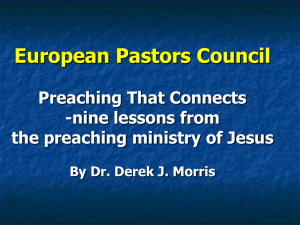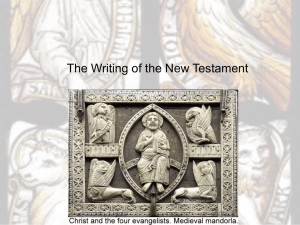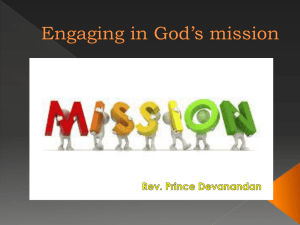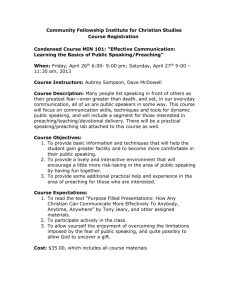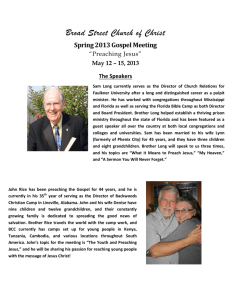Homily for Seventh Sunday in Ordinary Time (2014)
advertisement
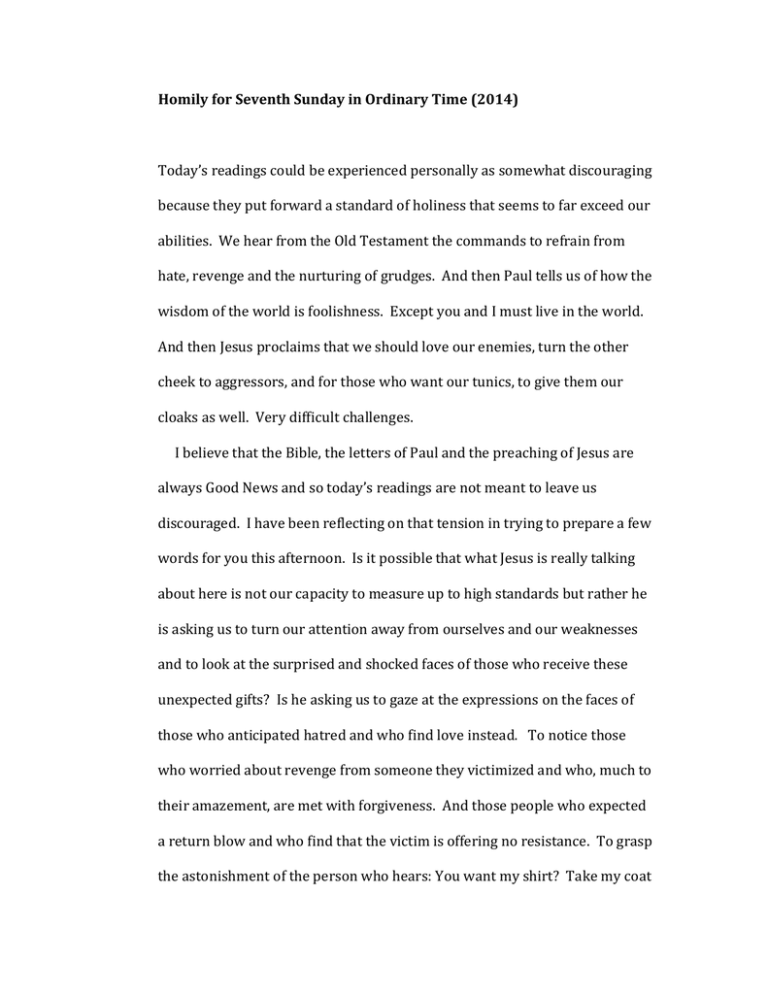
Homily for Seventh Sunday in Ordinary Time (2014) Today’s readings could be experienced personally as somewhat discouraging because they put forward a standard of holiness that seems to far exceed our abilities. We hear from the Old Testament the commands to refrain from hate, revenge and the nurturing of grudges. And then Paul tells us of how the wisdom of the world is foolishness. Except you and I must live in the world. And then Jesus proclaims that we should love our enemies, turn the other cheek to aggressors, and for those who want our tunics, to give them our cloaks as well. Very difficult challenges. I believe that the Bible, the letters of Paul and the preaching of Jesus are always Good News and so today’s readings are not meant to leave us discouraged. I have been reflecting on that tension in trying to prepare a few words for you this afternoon. Is it possible that what Jesus is really talking about here is not our capacity to measure up to high standards but rather he is asking us to turn our attention away from ourselves and our weaknesses and to look at the surprised and shocked faces of those who receive these unexpected gifts? Is he asking us to gaze at the expressions on the faces of those who anticipated hatred and who find love instead. To notice those who worried about revenge from someone they victimized and who, much to their amazement, are met with forgiveness. And those people who expected a return blow and who find that the victim is offering no resistance. To grasp the astonishment of the person who hears: You want my shirt? Take my coat as well. These surprises announce the kingdom and they take place not because of our strengths but because we are temples of God and God’s spirit is within us and inspires us to do things that we would never think we could do. Not always. But at times and maybe more times than we often believe, we do extraordinary deeds. But this is not my imagination that is talking because we have many accounts of God’s spirit working this way through very weak vessels of flesh and blood. I have two stories for you this afternoon. One story you might recall is that of Victoria Ruvolo who was driving home one evening a few years ago and all of a sudden a twenty pound frozen turkey smashed into her car’s windshield and broke almost every bone in her face. She spent so many months in the hospital recuperating, having her face reconstructed, and realizing that she would be living with deformity and pain for the rest of her life. The police caught the joyriding teenager who had thrown the turkey out of his car and he faced a sentence of many years in jail. But she saw he was sorry and she pleaded with the judicial authorities that he not be punished. The turkey thrower called her wonderful, said that he loved her, and while he was sobbing in her presence in the courtroom, she just said: “It’s okay, it’s okay…Just do good with your life.” “Just do good with your life.” When asked how she could be so forgiving, she simply said: “God gave me a second chance at life and I just passed it on.” There is someone who is allowing the spirit of God to operate in her life. We have all had second chances of one sort or other in life but have we allowed God’s spirit in us to pass those second chances on to others? Let’s hope so. The second story is far from Long Island where Victoria Ruvolo lives. It is out of Africa and it is the account of a priest who tired of teaching in a missionary school and he embarked on an experiment: to discover afresh the power of Jesus’s preaching by going to country villages, simply preaching the Gospel, and paying attention to people’s reactions. One of the many moving experiences that this priest had was the time he was preaching about forgiveness in the village square and he noticed someone who was sitting alone outside the circle of the other villagers; this man seemed to be ostracized. But when the priest finished his sermon, this isolated man cried out in disbelief and hope, to the shock of his fellow villagers: “Do you mean that even someone who has violated a taboo can be forgiven?” And, of course, he had.The priest called the memoir of his time preaching in the bush Christianity Rediscovered. He saw in the shocked but hopeful face of that ostracized villager how extraordinary Jesus’s message really is. And we can do the same without having to go into foreign towns. We will be able to experience the spirit of God within ourselves in the faces of those whom we forgive, those who had no claim to be forgiven, those who did not expect to receive gratuitous kindnesses from us. Like Victoria Ruvolo, what gifts we have received from God we pass on. At the opening of her book she quotes a Chinese proverb: “He who seeks vengeance must dig two graves: one for his enemy and one for himself.” Of course, the proverb is a warning about how keeping an enemy will also bury ourselves in our hates and resentments. Let us thank God always that our Resurrection faith tells us and our actions reveal time and time again: We are not diggers of graves. We are bringers of life, always passing on God’s second chances. Amen. James Bernauer, S.J. St. Ignatius Loyola Church February 22, 2014
